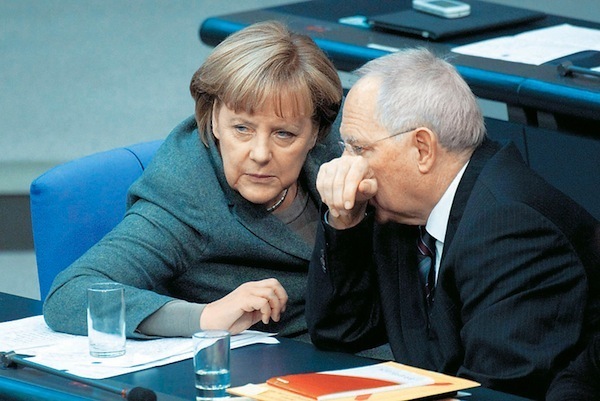by
Is Frau Merkel forcing Greece’s departure from the Eurozone (EZ)? As Eurogroup ministers met again in Brussels on 16thFebruary, a solution to the present crisis could not be found. Although the much-favoured option involves de facto cancellation of part of the Greek debt, what SYRIZA was asking for at the moment was only a short-term ‘bridging loan’ to give the country some breathing room; i.e., to ensure the Greek central bank does not run out of money in the coming week.
And though the EU Commission seemed sympathetic, the Germans were not. The German finance minister, Herr Schäuble, repeatedly said a deal was highly unlikely, and only last week Germany had stymied a deal in Brussels – not once but twice! Unsurprisingly, the Greek finance minister rejected the German offer because, in reality, nothing was on offer.
Why? The answer is fairly obvious: the CDU-led government in Berlin believes that granting any concessions to Greece willl immediately be followed by demands from others – meaning not just those countries which have already negotiated with the troika, but other too-large-to-fail countries such as Spain and Italy. So Greece is being sacrificed ‘pour encourager les autres’.
If Greece is forced out of the Euro, as will be inevitable once its central bank goes bust, the cost to the Greek people will be very high – far too high, the German government reckons, for any other EZ country to attempt a show of independence. When the money runs out on 28th February (or more likely earlier), the banking system will shut down and capital controls will need to be imposed. This will force Greece not just from the EZ but from the EU.
To revive the banks, a new currency (let’s call it the ‘New Drachma’ or ND) will be issued, probably on a one-to-one basis. Because Greece will now be locked out of international financial markets, the forex markets will drastically mark down the ND, a spiral of domestic inflation will ensue and many Greeks will find it next to impossible to pay their Euro or other-denominated bills.
Once ‘Grexit’ takes place (which the SYRIZA government does not want), Greek commercial banks, having traded in their Euro-denominated bonds at the central bank for ND-denominated ones, will quickly become insolvent. Small businessmen (of which Greece has a great many) would go bust as their savings are eroded by inflation. More importantly, Greece currently spends 5 percent of its GDP on fuel imports – either Greeks would forego fuel, or else look for oil and finance from Russia and China, a prospect which deeply worries Washington. The large Greek trade deficit, at present over 10% of GDP, will soar.
German finance minister Wolfgang Schäuble has repeatedly blocked a deal on Greece.
For a time at least, recession will deepen, unemployment (already 26%) will increase and food riots might break out, as in Argentina in late 2001. Most dangerously, social unrest might trigger a right-wing coup by sections of the police and army.
So, is it all about German stubbornness? Yes, but a compromise on Greek finance is not the only thing that’s needed. What really matters is Germany’s apparent unwillingness to contemplate any change to current arrangements for the Euro. It matters little whether one is pro- or anti-Euro. What matters is the question of joint responsibility – ‘mutuality’ is the preferred term. As long as individual EZ members depend exclusively on their own Euro-denominated bonds for finance (and each EZ state can be held hostage by the financial markets), the Euro cannot succeed in the long term. As I’ve argued elsewhere, if individual US states were dependent on EZ-style financial arrangements, the USA would long ago have ceased to exist.
Various Eurobond arrangements which share out financial risks have been proposed, so these will not be reviewed here. To complement Eurobonds, an EZ-wide fiscal policy is needed too – one that both taxes and (as in the USA) distributes benefits. For ordinary people, the EZ offers less and less – it now seems to offer only endless German-led austerity based on an export-led growth model which, logically, cannot be replicated everywhere in the EZ. Until Herr Schäuble and the German government understand this key lesson, Greece – and the EZ as a whole – is doomed. This remains true whatever happens next in the EZ and Europe.
About George Irvin



















